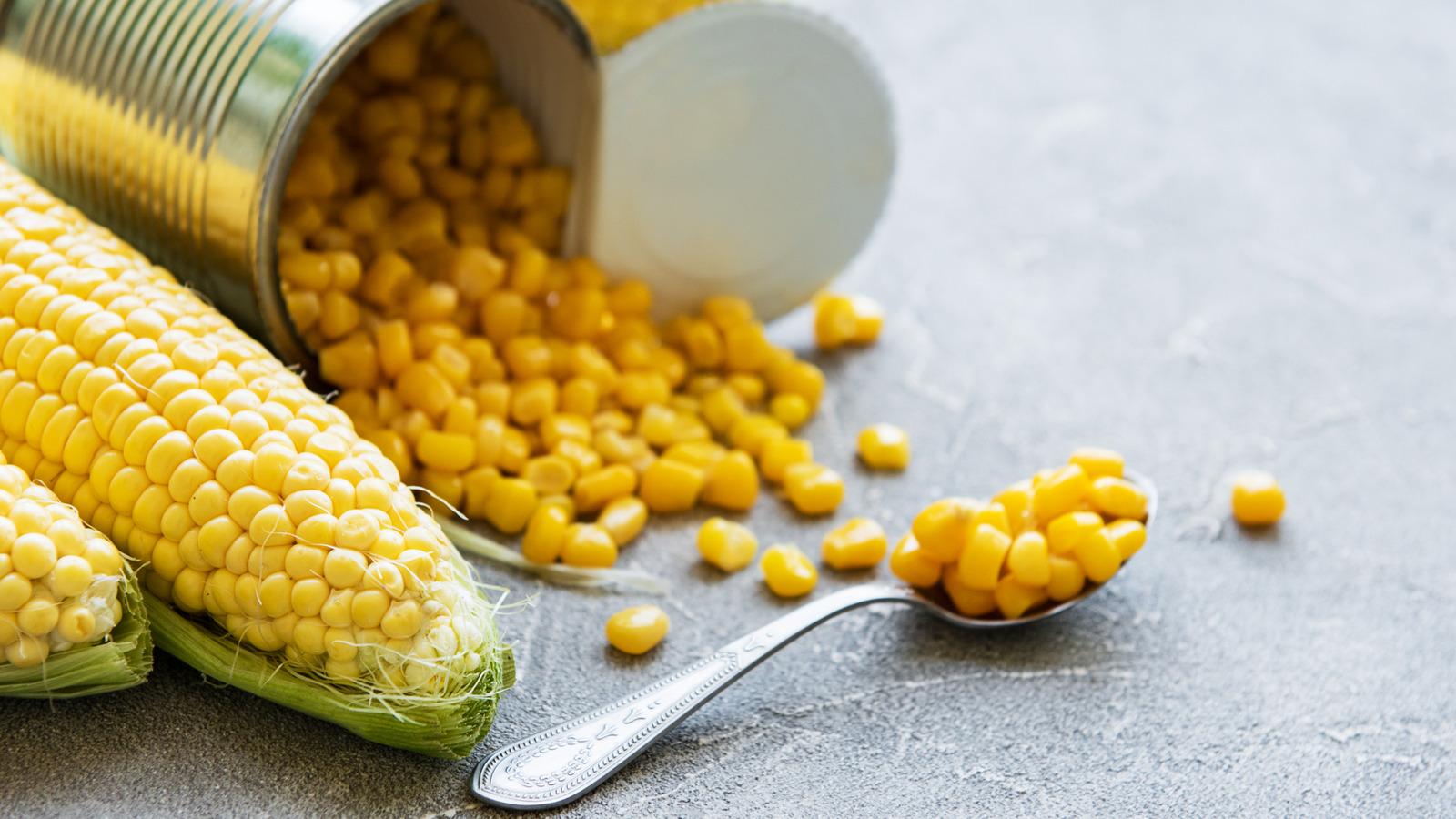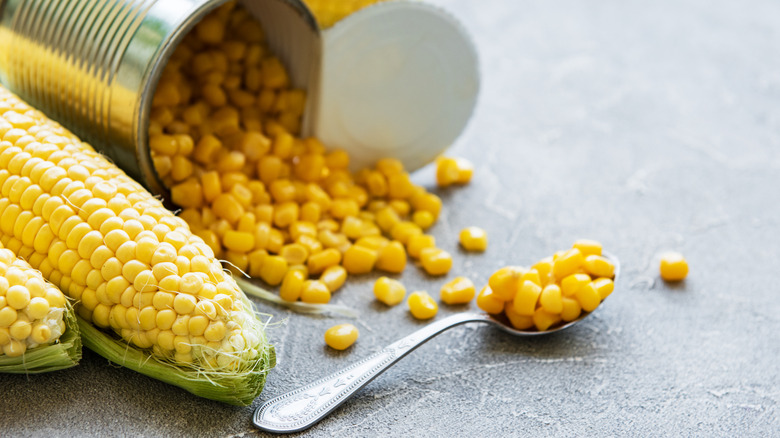
Almaje/Getty Images
We may receive a commission on purchases made from links.
The sweet, earthy flavor of corn is versatile and delicious. From eating a fresh ear of corn on the cob to incorporating sweet kernels into your favorite dishes like creamed corn or corn bread, the ways to serve corn in your weekly meals are nearly endless. One advantage of corn — and a trait that increases its versatility — is that it can be preserved and sold in several formats. Whether you're buying unhusked ears, bags of frozen sweet corn kernels, or shelf-stable canned corn, there are many varieties to choose from when you hit the grocery store.
But because of the farming, processing, and production steps used for every type of corn, it is susceptible to bacteria, foreign bodies, and contamination that may lead to illness or injury. As a result, corn products have been the subject of multiple recalls over the years, in an effort to help keep customers safe. Read on to learn more about the biggest corn recalls in U.S. history.
2025 Wismettac Asian Foods corn puff recall
Wismettac Asian Foods, Inc., based out of Santa Fe Springs, California, announced a nationwide recall in January 2025 for the curry flavor of its Curvee Puffs Corn Puff Snacks because of an undeclared allergen. The puffs contain milk products, but it was not indicated on the packaging. Later the same month, Wismettac expanded the recall to include the Sea Salt & Umami and Corn Potage flavors for the same reason.
The affected products were pulled from shelves to prevent severe or even life-threatening reactions for those with milk allergies. Though milk allergies are most common in infants and young children, adults can be susceptible as well. Like all allergies, reactions can range from mild symptoms like hives or itchiness to severe symptoms like anaphylaxis.
The widespread recall affected states nationwide, along with Mexico and Peru. Both the company and the Federal Drug Administration (FDA) urged customers to either throw away products with the impacted UPC — which were sold in retail stores, restaurants, and online — or return them to the place of purchase for a full refund.
2024 Tipical Latin Food Corp sweet corn pancake recall
In October 2024, Miami-based company Tipical Latin Food Corp announced a recall of its Cachapa de Maiz Venezuelan corn pancakes. Two lots of the product were recalled after being distributed nationwide because of undeclared wheat, an ingredient that could cause potentially life-threatening reactions for people with severe allergies or celiac disease.
Though often used interchangeably, wheat allergies and celiac disease are two separate conditions. The former can lead to minor symptoms like swelling and hives, but can also cause reactions as severe as anaphylaxis. Celiac disease, on the other hand, is an autoimmune disease in which gluten damages the small intestine; wheat is a major source of gluten, so unknowingly consuming wheat-containing products can lead to gastrointestinal upset, brain fog, and fatigue.
For those without wheat allergies, the product was perfectly safe. But if purchased by those who could have a potential reaction, the company urged customers to discard the pancakes to avoid adverse effects. Luckily, no reactions were ever reported.
2023 Twin City Foods frozen corn recall
In late August of 2023, Twin City Foods announced a voluntary recall of its frozen sweet corn and frozen mixed vegetables. The two products had been potentially contaminated with listeria monocytogenes. The contamination was first discovered as the result of a third-party lab test on the sweet cut corn, leading to the recall.
According to the Center for Disease Control (CDC), listeria infections are the third leading cause of death from food borne illnesses in the U.S. This potentially life-threatening bacterium infects people who consume contaminated food and is especially dangerous in the young, elderly, pregnant, and those with weakened immune systems.
Twin City Foods was the supplier for two major grocery chains, resulting in the contaminated mixed veggies and corn being pulled from the frozen aisles of Food Lion and Kroger stores across the country. Customers who purchased the potentially tainted products were told to either toss them or return them to the store of purchase for a full refund. Thankfully, no illnesses were ever reported.
2018 McCain Foods frozen corn recall

Qwart/Getty Images
In late 2018, a series of food recalls occurred due to potential contamination from salmonella and listeria monocytogenes. The two cause similar symptoms, such as stomach pain, fever, and gastrointestinal upset. Brands from Trader Joe's to Whole Foods to 7-Eleven issued recalls of various products to help prevent widespread illness due to contamination. It would later come out that McCain Foods (a billion-dollar Canadian food service company that manufactures frozen foods) was the source of all the tainted ingredients.
The recall originally began with any products containing fire-roasted super sweet corn. Eventually, the recalls would encompass everything produced at McCain's Colton, California-based facility — or a staggering 99 million pounds of food. Affected products included caramelized onions and mushrooms, and other vegetable products like onions, chiles, and peppers. Over a dozen companies were forced to issue recalls for at least 146 products containing ingredients supplied by McCain.
2018 ready-to-eat salad recall
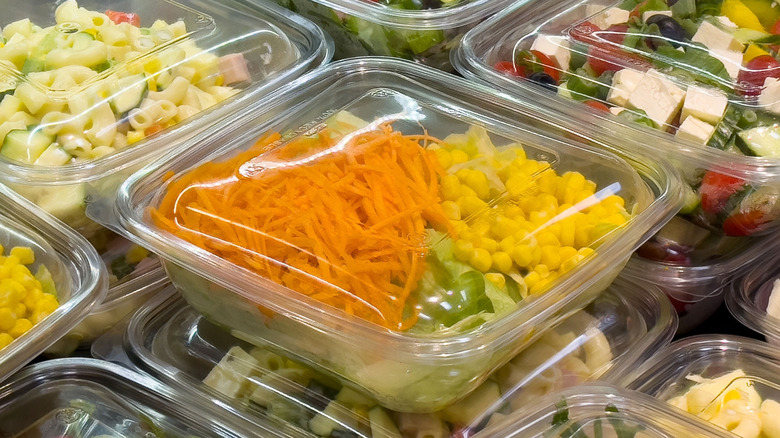
HelgaQ/Shutterstock
Major grocery retailers like Whole Foods, Trader Joe's, and Walmart were forced to recall nearly 3,000 pounds of ready-to-eat salads in October 2018 due to possible contamination with both listeria and salmonella. These two bacteria cause the most food borne illnesses, hospitalizations, and deaths in the United States, so once their presence was discovered, it was vital to initiate the recalls to prevent widespread illness.
Both salmonella and listeria can be introduced at any point along the "farm-to-fork continuum from production to consumption," according to the National Library of Medicine, making it extremely difficult to prevent them altogether — but steps can be taken to reduce the risk of contamination. In this case, contaminated produce was used in the production of ready-made, refreshing corn salads by multiple companies, including GHSE, Prime Deli Corporation, and Mary's Harvest Fresh Foods, that all used the same supplier. In total, the potentially tainted corn resulted in the recall of seven different ready-made salads.
2018 Del Monte Foods canned corn recall
In December 2018, Del Monte announced it was recalling nearly 65,000 cases of its canned fiesta corn because of under-processing. During production, parts of the sterilization process were not properly followed, which could have led to the introduction of life-threatening pathogens and organisms in the corn like botulism, a toxin that attacks the body's nervous system.
In the right environment, botulism can grow and become lethal. Improperly canned food sometimes provides the right temperature, moisture levels, and amount of acid, sugar, salt, and oxygen for the bacteria that create botulism to thrive. Though more common in improperly canned homemade foods, store-bought and commercially canned foods can also be contaminated if not properly processed — as was the case with Del Monte's fiesta corn.
The recalled products were sent to 25 states and 12 countries around the globe, including Belize, El Salvador, Haiti, and Saint Lucia. As of the recall date, there were no illnesses or injuries reported.
2017 Giant Food frozen corn recall
In November 2017, Giant Food Stores — alongside Martin's Food Markets and Stop & Shop — recalled its store-brand frozen whole kernel sweet corn due to potential listeria contamination. All three supermarkets shared the same unnamed supplier and then sold the corn under their own store-banded name. The voluntary recall was set in motion by the stores themselves in an effort to promote awareness of the issue and prevent any illnesses.
The timing of the recall was especially bad, given its announcement in late November and the prevalence of corn used in many Thanksgiving side dishes, like corn casserole or cornbread stuffing (also known as cornbread dressing if you're from the south). Customers were urged to check their freezers and throw away or return any corn with specific UPC codes and best-by dates of October 2019 for a full refund. Luckily, the recall resulted in no reported illnesses.
2016 CRF Frozen Foods frozen corn recall
In 2016, the CDC and the FDA partnered to investigate a multi-state outbreak of listeria infections. Nine people were reported ill across four states from September 2013 through May 2016, resulting in three deaths. Laboratory results eventually showed that the outbreak was tied to frozen vegetables from CRF Frozen Foods based in Pasco, Washington. The investigation by the Ohio Department of Agriculture uncovered that Meijer brand frozen corn (produced by CRF Frozen Foods) contained the same listeria bacteria causing the reported illnesses.
This discovery led to the initial recall of 11 frozen vegetable products, and eventually, to the recall of all frozen fruits and vegetables processed in CRF Frozen Foods' facilities, totaling 358 products across 42 brands. This massive recall crippled CRF's business, leading it to lay off more than 300 workers and, ultimately, shutter its doors for good. It has since, however, reopened under a new name and new ownership.
2015 Bonduelle USA, Inc. frozen corn recall
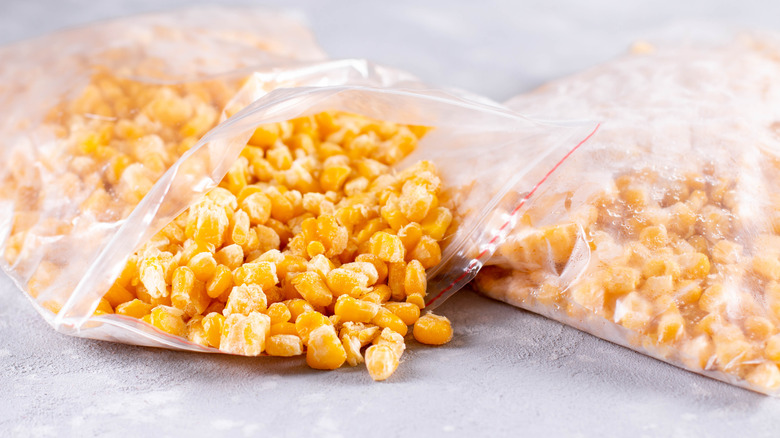
Qwart/Getty Images
In September 2015, Bonduelle USA announced a sweeping recall of more than 9,000 cases of its frozen corn. The product, potentially contaminated with listeria, had been distributed across 15 states. Unlike many other bacteria, listeria can survive at freezing temperatures — so even frozen food (like Bonduelle's corn) are not safe from this microbe. Though it does not multiply at these temperatures, once it warms up to refrigerator temperatures, it will begin to grow again. Depending on the food, it must be heated to between 145 and 160 degrees Fahrenheit to destroy any lingering bacteria.
Bonduelle USA, based in Brockport, New York, was first alerted to the problem with its frozen corn, when listeria was detected during testing in Tennessee. The contaminated vegetable had been sold under several different names at various grocery chains, including Market Basket and Bountiful Harvest, all of which were recalled. Thankfully, no illnesses were ever reported.
2012 Morgan Foods, Inc. corn chowder recall
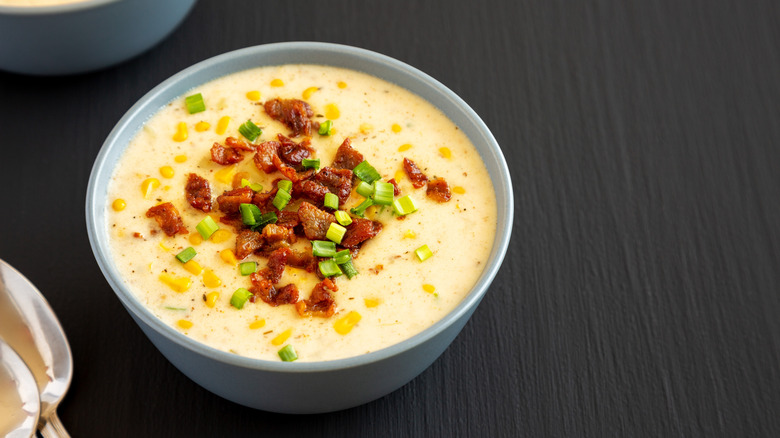
Liudmyla Chuhunova/Shutterstock
In July 2012, nearly 95,000 pounds of corn chowder were recalled by Morgan Foods, Inc. due to the possibility that it contained foreign materials. The recall was initiated after two customers reported finding pieces of a marker or pen in their soup. Foreign bodies in food can lead to dental injuries to the teeth and gums, and can cause more severe injuries like lacerations or perforations of the throat, stomach, or intestine. To alert customers to the problem, a Class II recall was issued (indicating a moderate to high risk).
The recall impacted four different types of chowder, all with best-by dates of March 1, 2014. The chowders — all sold under different brand names, including Wegman's and America's Choice — had been distributed to Texas, New York, Illinois, Kansas, and 11 other states. Despite the two initial customer complaints, no additional injuries were ever reported.
2010 Pasco Processing LLC fresh corn recall

Branex/Getty Images
Over 2,000 cases of packaged corn and poblano peppers were recalled in July 2010 due to possible listeria monocytogenes contamination. The contaminated products were discovered during routine testing by the manufacturer, Pasco Processing out of Pasco, Washington. The recalled corn-and-pepper combo was then distributed by J.R. Simplot Co. in 20-pound bags to two food-service distributors in California and another in Arizona.
Those food-service distributors then sold the product to several Chipotle Mexican Grill locations across three states. Chipotle removed all potentially contaminated products from its restaurants and quarantined the produce before destroying it. It was later uncovered that none of the tainted vegetables had been delivered to the restaurants, and no illnesses were ever reported. Chipotle would later came under fire in 2015 for multiple counts of food contamination, leading to a hefty $25 million fine and its fall from popularity (though it would eventually witness a comeback).
2008 Supreme Cuts fresh corn recall
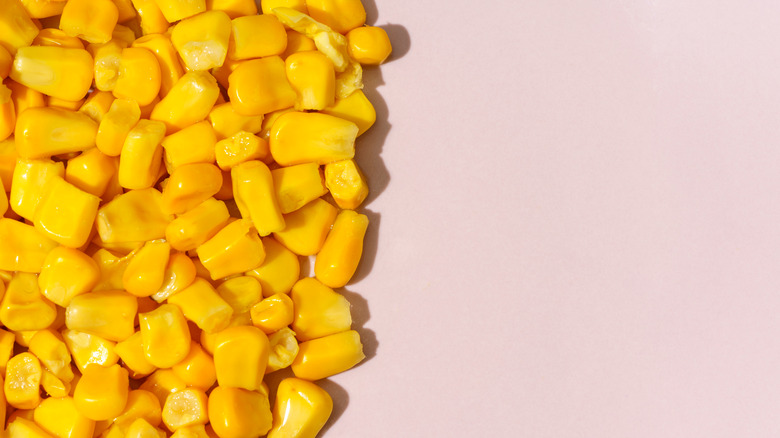
Javier Zayas Photography/Getty Images
In late May 2008, New Jersey-based company Supreme Cuts announced a voluntary recall of its fresh kernel corn due to potential contamination with listeria monocytogenes. Listeria monocytogenes can be transmitted in food at almost any point in the farming or production process, including harvesting, processing, packing, or manufacturing. If the bacteria are ingested, they can cause many different symptoms that range in severity. The non-invasive, milder form of listeriosis causes gastrointestinal upset and mild flu-like symptoms that can last for a few days. The more severe form — which is life-threatening for those with weakened immune systems — causes critical symptoms like confusion and convulsions.
The affected corn, sold under the brand name Off the Cob, consisted of fresh kernels packaged in 12-ounce bags (instead of canned) with a specific best-by date. The bagged corn had been distributed and sold throughout New Jersey and Massachusetts, resulting in the recall of 87 cases of the product.
2000 Aventis StarLink corn recall
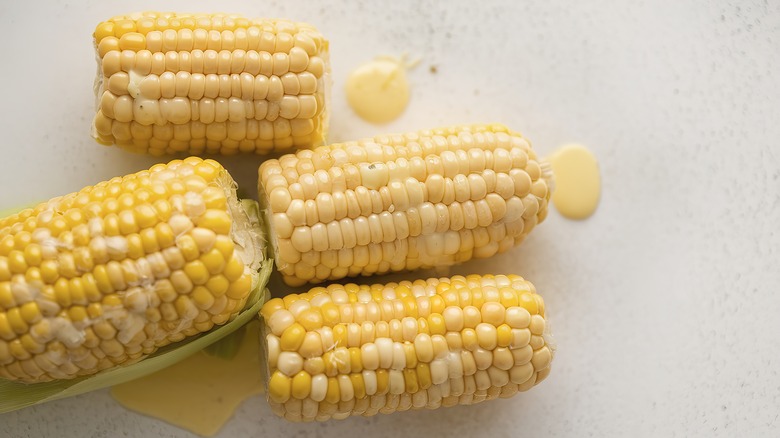
Stefan Nita / 500px/Getty Images
In 1997, Aventis Crop Science developed a new type of corn called StarLink that protected crops against caterpillars. The FDA, however, only approved it to be used in cattle feed. But in 2000, an Iowa-based genetic ID lab tested store-bought Taco Bell-brand taco shells — and surprisingly, the product included StarLink corn DNA, despite the fact that it was not approved for human consumption.
These taco shells were just the tip of the iceberg, with the genetically modified corn DNA popping up in several other products created for humans. The problem, however, was that the StarLink corn's unique protein, Cry9C, was considered a potential human allergen (which was why it wasn't approved initially) — and the FDA began receiving reports of adverse reactions from products containing it.
More than 300 products containing traces of StarLink corn were recalled, and in total, over 40 people reported adverse effects to the FDA. There were also three deaths as the result of severe allergic reactions. The CDC later concluded, however, that none of the severe reactions were linked to the StarLink protein.



